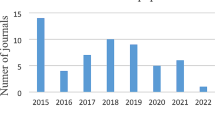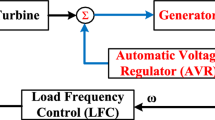Abstract
Frequency forecasting is an important aspect of power system operation. The system frequency varies with load-generation imbalance. Frequency variation depends upon various parameters including system inertia. System inertia determines the rate of fall of frequency after the disturbance in the grid. Though, inertia of the system is not considered while forecasting the frequency of power system during planning and operation. This leads to significant errors in forecasting. In this paper, the effect of inertia on frequency forecasting is analysed for a particular grid system. In this paper, a parameter equivalent to system inertia is introduced. This parameter is used to forecast the frequency of a typical power grid for any instant of time. The system gives appreciable result with reduced error .






Similar content being viewed by others
References
D. Chourey, An artificial neural network based approach for forecasting the frequency of power grid to achieve optimal frequency stabilization. Int. J. Adv. Res. Electr. Electron. Instrum. Eng. (IJAREEIE). (2017). https://doi.org/10.15662/ijareeie.2017.0602054
A. Moeini, I. Kamwa, Analytical concepts for reactive power based primary frequency control in power systems. IEEE Trans. Power Syst. 31(6), 4217–4230 (2016). https://doi.org/10.1109/TPWRS.2015.2511153
J.W. Ingleson, E. Allen, Tracking the eastern interconnection frequency governing characteristic, in IEEE PES General Meeting, Minneapolis, MN (2010), pp. 1–6. https://doi.org/10.1109/pes.2010.5589872
S. Sharma, S.H. Huang, N. Sarma, System inertia frequency response estimation and impact of renewable resources in ERCOT interconnection, in 2011 IEEE Power and Energy Society General Meeting San Diego, CA (2011), pp. 1–6. https://doi.org/10.1109/pes.2011.6038993
C. Zhao, U. Topcu, N. Li, S. Low, Design and stability of load-side primary frequency control in power systems. IEEE Trans. Autom. Control 59(5), 1177–1189 (2014). https://doi.org/10.1109/TAC.2014.2298140
C. Moya, W. Zhang, J. Lian, K. Kalsi, A hierarchical framework for demand-side frequency control, in 2014 American Control Conference, Portland, OR, (2014), pp. 52–57. https://doi.org/10.1109/acc.2014.6859304
Z. Akhtar, B. Chaudhuri, S.Y. Ron Hui, Primary frequency control contribution from smart loads using reactive compensation. IEEE Trans. Smart Grid 6(5), 2356–2365 (2015). https://doi.org/10.1109/tsg.2015.2402637
H.S. Hippert, C.E. Pedreira, R.C. Souza, Neural networks for short-term load forecasting: a review and evaluation. IEEE Trans. Power Syst. 16(1), 44–55 (2001)
G. Zhang, B.E. Patuwo, M.Y. Hu, Forecasting with artificial neural networks: the state of art. Int. J. Forecast. 14, 35–62 (1998)
J.M. Zurada, Introduction to Artificial Neural System, 1st edn. (West Pub. Comp., St. Paul, 2006)
A.J. Woods, B.F. Woolenberg, Power generation operation & control, 2nd edn. (Wiley, NewYork, 1996)
H. Sadat, Power System Analysis, 2nd edn. (PSA Pub., Quezon, 2010)
S.K. Soone, S.C. Saxena, Frequency response characteristics of an interconnected power system-a case study of regional grid in India, in 6th Intentional R&D Conference On Sustainable Development Of Water and Energy Resources-Needs And Challenges (2007)
A. Moeini, I. Kamwa, Analytical concepts for reactive power based primary frequency control in power systems. IEEE Trans. Power Syst. 31(6), 4217–4230 (2016)
NERC Frequency Response Initiative Report: The Reliability Role of Frequency Response, (2012)
C. Zhao, U. Topcu, N. Li, S. Low, Design and stability of loadide primary frequency control in power systems. IEEE Trans. Autom. Control 59(5), 1177–1189 (2014)
M.T. Hagan, M.B. Menhaj, Training feedforward networks with the marquardt algorithm. IEEE Trans. Neural Netw. 5(6), 989–993 (1994)
J.M. Zurada, Introduction to Artificial Neural System, 1st edn. (West Pub. Comp., St. Paul, 2006)
F.O. Karray, C. De Silva, Soft Computing and Intelligent System Design, 1 Indian edn. (Pearson Edu., Noida, 2009)
S. Rajasekaran, G.A. Vijayalakshmi Pai, Neural Networks, Fuzzy Logic and Genetic Algorithms; Synthesis and Application, 1st edn. (PHI Learning Private Ltd, New Delhi, 2011)
V. Rajnikanth, G.V. Marutheswar, Distribution system short term load and frequency forecast (STLFF) for optimal UI charges: a neural wavelet based approach. Int. J. Appl. Innov. Eng. Manag. 2(7), 142–147 (2013)
Author information
Authors and Affiliations
Corresponding author
Appendix
Appendix

Rights and permissions
About this article
Cite this article
Chourey, D.R., Gupta, H., Kumar, A. et al. Analyzing Effect of System Inertia on Grid Frequency Forecasting Usnig Two Stage Neuro-Fuzzy System. J. Inst. Eng. India Ser. B 99, 125–136 (2018). https://doi.org/10.1007/s40031-017-0308-2
Received:
Accepted:
Published:
Issue Date:
DOI: https://doi.org/10.1007/s40031-017-0308-2




